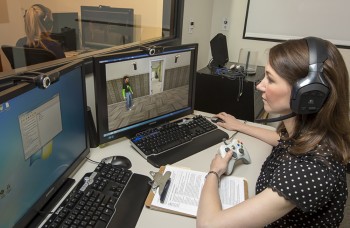Ph.D. - Psychology, Cognitive Science
University of California, Los Angeles - 2003

Daniel Krawczyk
Debbie and Jim Francis Chair in Behavioral Brain Sciences
Professor - Department of Psychology
Research Interests: Understanding reasoning and decision-making via behavioral studies, pupillometry, and brain stimulation
972-883-3234
GR 4.126
Reasoning Lab
Endowed Profile
Curriculum Vitae
Substack
ORCID
Currently accepting undergraduate and graduate students
Professional Preparation
M.A. - Cognitive Neuroscience
University of California, Los Angeles - 2000
University of California, Los Angeles - 2000
B.A. - Psychology
State University of New York, College at Fredonia - 1998
State University of New York, College at Fredonia - 1998
Research Areas
Research Interests
REASONING AND DECISION MAKING:My research focuses on the way that people attend to and remember information in order to solve problems, reason, and make decisions. I am particularly interested in how attention and memory interact with our environment to influence our decisions. Specifically I am interested in cognitive biases related to these interactions (e.g. framing effects, confirmation bias).
PRODUCTIVE DIALOGUE:
I am interested in growing an area of research addressing the growing challenge of radicalization in our information space. It has become hard to ignore the fact that our society has become polarized with alarming numbers of people holding fast to extreme ideological positions. Confirmation bias is a major culprit in this process, but additionally digital "echo chambers", personalized search algorithms, and biased media add to the problem. We are focused on investigating the nature of confirmation bias, as well as examining methods that can play a role in reducing radicalization. These include the role of open dialogue, examination of core values, and rethinking how those integrate into our political positions.
BRAIN STIMULATION FOR COGNITIVE IMPROVEMENT:
I am also interested in brain functions supporting attention, memory, and human performance. I am exploring the potential for brain stimulation via transcrainial Photobiomodulation (tPBM) for improving performance. This technique may be helpful in areas such a recovery from the cognitive or motor effects of brain injuries.
Publications
Kandalaft, M. R., Didehbani, N., Cullum, C. M., Krawczyk D. C., Allen, T., Tamminga, C. A., & Chapman, S. B. (in press). The Wechsler Social Perception Test: A preliminary comparison with other measures of social cognition. Journal of Psychoeducational Assessment. [link] In Press - Publication
Kandalaft, M. R., Didehbani, N., Krawczyk D. C., Allen, T.T., & Chapman, S. B.
(2013). Virtual reality social skills training for young adults with Asperger Syndrome.
Journal of Autism and Developmental Disorders, 43, 34-44. 2013 - Publication
Krawczyk, D. C. & D’Esposito, M. (2013). Modulation of working memory function by
motivation through loss-aversion. Human Brain Mapping, 34, 762-774. 2013 - Publication
Krawczyk, D. C. (2012). The cognition and neuroscience of human reasoning. Brain Research, 1428, 13-23. [link] 2012 - Publication
Boggan, A. L., Bartlett, J. C., & Krawczyk, D. C. (2012). Chess Masters show a hallmark of face processing for chess. Journal of Experimental Psychology: General, 141, 37-42. [link] 2012 - Publication
Maguire, M. J., McClelland, M. M., Donovan, C. E., Tillman, G. D., & Krawczyk, D. C. (2012). Tracking cognitive phases in analogical reasoning with event-related potentials. Journal of Experimental Psychology: Learning, Memory, and Cognition, 38, 273-281. [link] 2012 - Publication
Didehbani, N., Shad, M. U., Kandalaft, M. R., Allen, T.T., Tamminga, C. A., Krawczyk
D. C. & Chapman, S. B. (2012). Insight into Illness and social attributional style in
Asperger's syndrome. Journal of Autism and Developmental Disorders, 42, 2754-
2760. 2012 - Publication
Shokri Kojori, E., Motes, M. A., Rypma, B., & Krawczyk, D. C. (2012). The network architecture of cortical processing in visuo-spatial reasoning. Scientific Reports, 2, 411. [link] 2012 - Publication
Awards
Invited expert State of the Science Meeting on Blast Traumatic Brain Injury - U.S. Dept of Defense [2015]
Dissertation Research Award - APA [2002]
Appointments
Professor
The University of Texas at Dallas [2018–Present]
The University of Texas at Dallas [2018–Present]
Associate Professor
The University of Texas at Dallas [2012–2018]
The University of Texas at Dallas [2012–2018]
Assistant Professor
The University of Texas at Dallas [2006–2012]
The University of Texas at Dallas [2006–2012]
Assistant to Associate Professor (research track)
University of Texas Southwestern Medical Center [2013–2025]
University of Texas Southwestern Medical Center [2013–2025]
Ruth L. Kirschstein Post-Doctoral Fellow
University of California, Berkeley [2003–2006]
Laboratory of Mark D'Esposito
University of California, Berkeley [2003–2006]
Laboratory of Mark D'Esposito
Projects
Enhancing Cognitive Performance using Transcranial Photobiomodulation
tPBM is a promising approach is to harness the state-of-the-art indirect interventions on brain physiology by modulating the neural correlates of learning, memory, reasoning, and higher-order decision making.Scope / Project ObjectiveScope. Our approach to demonstrating the efficacy of tPBM to promote cognitive performance will proceed in two distinct phases. Phase 1 will feature a pilot study to evaluate the hypothesis that we can effect changes in cognitive performance or psychological well-being with tPBM administered to the prefrontal cortex (PFC). If the hypothesis holds in phase 1, we will validate pilot study results and support with pupillary biomarkers of improved focus and cognitive control.
Decision making and cognitive biases
An ongoing effort in our lab is to investigate the neural basis of factors related to judgment and decision-making. This has included studies of framing effects, judgments about oneself versus others, and work on multi-attribute decisions. In these studies, we investigate how individuals make choices based on social, financial, and contextual factors.We also work on biases and heuristics in applied settings such as intelligence analysis. Intelligence analysts face challenges including high pressure to make decisions, complexity, and ambiguity of information. We are interested in identifying and testing remediation for biases and errors caused by these challenges.
Presentations
Psychology and Neuroscience of Values
A talk about the values that drive people's lives.Reasoning and Intuition
A talk about some of our research in relational reasoning, lie detection, and the differences between our intuition and reasonAdditional Information
Personal Statement
Daniel Krawczyk is professor of Behavioral and Brain Sciences and holds the Debbie and Jim Francis Chair in Behavioral and Brain Sciences at The University of Texas at Dallas. His research focuses on understanding reasoning and decision making via methods including behavioral studies and brain stimulation. He has led multiple Department of Defense-funded research studies evaluating thinking and cognitive performance. He currently teaches courses in reasoning at both the undergraduate and graduate levels. He is currently the Deputy Director at the UT Dallas Center for BrainHealth®. He authored the book Reasoning: The Neuroscience of How We Think in 2017, a comprehensive guide to research on human reasoning. He has presented at over one-hundred scientific meetings, the TEDx stage, the Dallas Museum of Art, and is a regular speaker at the Perot Museum’s Social Science evening programs. His work has received media coverage on the NBC’s Today Show, PBS, NPR, and various science and technology podcasts. Dr. Krawczyk holds a PhD from the University of California, Los Angeles and was previously a Ruth L. Kirschstein Fellow at the University of California, Berkeley.Other Experience
- 2003-present Member of Neural Circuits and Brain Imaging Program Group at the Ernest Gallo Clinic and Research Center, UCSF
- 1999-2003 Member of Frontotemporal Dementia Research Group at the UCLA Department of Neurology (1999-2000) and USC Rancho Los Amigos Rehabilitation Center (2000-2003)
- 1998-2003 Member of the CogFog memory research group at UCLA.
Manuscripts Review
Biological Psychiatry, Neuroimage, Neuropsychologia, Neuroscience and Biobehavioral ReviewsNews Articles
Brain Study: Amygdala May Play Bigger Role in Facial Recognition
New research from the Center for BrainHealth at The University of Texas at Dallas reveals that the amygdala may play a larger role in the brain’s ability to recognize faces than previously thought.In a study published in Neuropsychologia, scientists found that the amygdala responded more specifically to faces than the fusiform face area (FFA), part of the brain traditionally known for facial recognition.
Scientist Gets Grant for Study of Veterans with Traumatic Brain Injuries
A researcher from the Center for BrainHealth at UT Dallas has been awarded a $2.7 million grant from the Department of Defense (DoD) under the Joint Warfighter Medical Research Program.The grant, awarded to Dr. Daniel Krawczyk, deputy director of the Center for BrainHealth, will fund research, via a virtual technology platform, to improve cognitive and functional deficits for veterans who have experienced traumatic brain injuries (TBI).
Grant to Help Brain Scientists Dig Deeper into Detecting Deception
Social interactions, such as navigating a conversation or determining whether someone is being truthful or not, are some of the most complex tasks the brain carries out, yet little is understood about the social brain on a neurobiological level.The Defense Advanced Research Projects Agency (DARPA) Biotechnology Office awarded scientists at the Center for BrainHealth at UT Dallas a $401,000 grant to develop a method that would map and quantify aspects of the social brain. Researchers will investigate deception using imaging technology and advanced mathematical analysis to quantify its brain-basis. The study will incorporate the impact of cultural differences, an aspect increasingly relevant to military intelligence gathering operations.
Virtual Reality Helps Children on Autism Spectrum Improve Social Skills
 Although most children with high-functioning autism have above average intellectual capabilities, they often experience social difficulties. Deficits in social communication and difficulty inhibiting thoughts and regulating emotions can lead to social isolation and low self-esteem. However, new research from the Center for BrainHealth at The University of Texas at Dallas shows that a new virtual reality training program is producing positive results.
Although most children with high-functioning autism have above average intellectual capabilities, they often experience social difficulties. Deficits in social communication and difficulty inhibiting thoughts and regulating emotions can lead to social isolation and low self-esteem. However, new research from the Center for BrainHealth at The University of Texas at Dallas shows that a new virtual reality training program is producing positive results.“Individuals with autism may become overwhelmed and anxious in social situations,” research clinician Dr. Nyaz Didehbani said. “The virtual reality training platform creates a safe place for participants to practice social situations without the intense fear of consequence.”
Wisdom in cause and action
Seeking evidence for why an event occurred is part of human nature, and it involves some of the most critical thinking processes we have. This process can allow us to determine the result of our actions based on immediate and clear feedback. Gaining insight into the world around us has resulted in numerous scientific discoveries. Engineering, medicine, and law are all fields in which clear feedback can allow us to make remarkable progress by understanding cause and effect relationships.A medical situation can be life-threatening if the direct cause is not identified. In a searching for causes, we may look to the internet – not always the most reliable source of information on the cause of a health problem. We might be led to assume that the cause of a severe headache is a brain aneurysm when in fact it’s a migraine. Or consider stock traders… they can make a lot of money when they understand causes and effects. But many value situations are complex and uncertain. Cognitive or emotional biases enter into our thinking when we don’t have all of the relevant information. Biased evaluation of the cause can lose traders a lot of money.
Activities
What are we currently working on?
We are actively studying the relationships between thinking style (Cognitive Reflection) and framing effects in decision making. We use eye-tracking to examine the pupillometry response when we process information in a deep or shallow way. This may provide insight into the link between fast/slow thinking mode and cognitive bias.We are also studying a brain stimulation method called transcranial photobiomodulation (tPBM). There is evidence that tPBM can briefly enhance neuronal excitation which may translate to superior attention and memory.